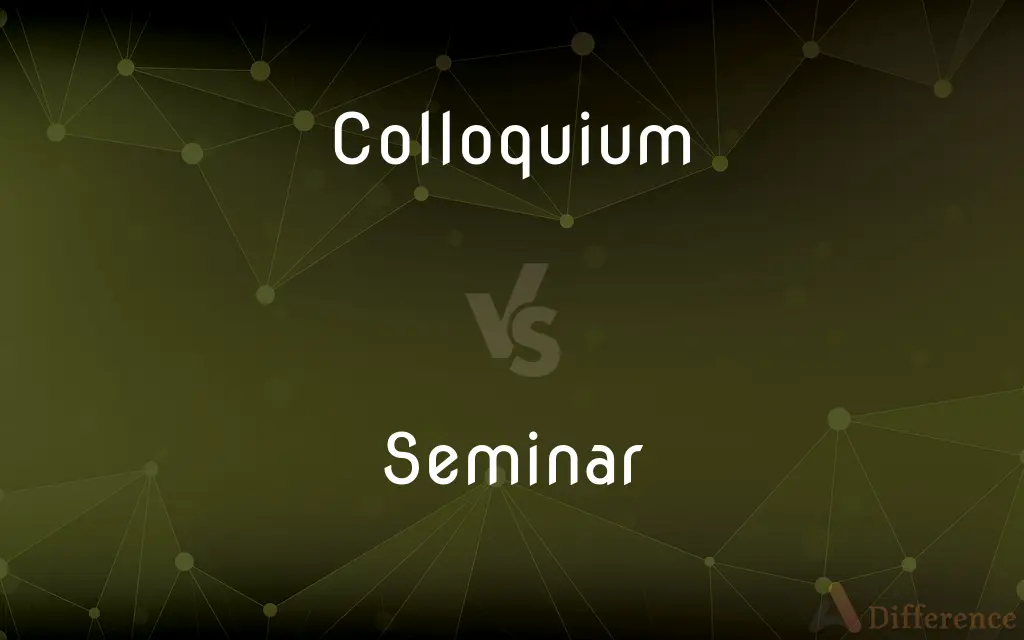Colloquium vs. Seminar — What's the Difference?
By Fiza Rafique & Urooj Arif — Updated on March 6, 2024
A colloquium is an academic meeting for expert discussion, while a seminar is a class for study and discussion led by an expert.

Difference Between Colloquium and Seminar
Table of Contents
ADVERTISEMENT
Key Differences
Colloquia are formal gatherings in the academic world where scholars, researchers, or students present their research findings or discuss topics of interest in a specific field. These meetings are typically designed for the exchange of advanced knowledge and may involve multiple speakers or panels over the course of one or several days. Seminars, on the other hand, are more instructional or educational sessions, often part of an academic course, where a small group of students engage in in-depth discussion and analysis on a particular subject, guided by a professor or expert.
While colloquia aim to foster scholarly exchange and networking among professionals and academics at an advanced level, seminars focus on teaching and learning, aiming to deepen participants' understanding of a topic through interaction. This difference in purpose influences the structure and audience of each event, with colloquia often open to a wider audience interested in the subject matter, whereas seminars are typically reserved for students registered in a specific course or program.
The presentation style also differs; colloquia presentations are usually more formal, with prepared speeches or papers, followed by a question-and-answer session. Seminars, however, encourage active participation from all attendees, often involving discussions, group work, and presentations by the students themselves. This interactive nature of seminars makes them a key component of higher education, particularly in graduate programs.
Colloquia often address the latest research, trends, and developments within a field, providing a platform for knowledge dissemination and debate among experts. Seminars, while they can also cover current topics, are generally more focused on comprehensive understanding and academic skill development, including critical thinking and analytical skills.
The outcomes of these gatherings can also vary; colloquia may lead to collaborations, new research initiatives, and publications, serving as a catalyst for further academic exploration. Seminars, meanwhile, are designed to enhance students' knowledge and academic performance, often contributing to their coursework, thesis, or examination preparations.
ADVERTISEMENT
Comparison Chart
Purpose
Scholarly exchange and networking
Teaching and learning
Audience
Professionals, academics, researchers
Students, particularly in higher education
Presentation
Formal speeches or papers, followed by Q&A
Interactive discussions, group work, student presentations
Content
Latest research, trends, and developments
Comprehensive understanding, academic skill development
Outcomes
Collaborations, research initiatives, publications
Enhanced knowledge, academic performance
Compare with Definitions
Colloquium
Research Focused.
Researchers presented their latest findings on renewable energy at the colloquium.
Seminar
Educational Session.
The seminar on medieval history involved student-led discussions each week.
Colloquium
Expert Meeting.
The international colloquium on climate change brought together leading scientists.
Seminar
Skill Development.
The seminar focused on developing critical analysis and research skills.
Colloquium
Networking Opportunities.
The colloquium offered networking sessions for participants to discuss collaborations.
Seminar
Course Component.
Completion of the seminar series was a requirement for the graduate program.
Colloquium
Formal Presentations.
Each colloquium session concluded with a Q&A, encouraging academic debate.
Seminar
Small Group Interaction.
Seminars allow for personalized feedback from the instructor.
Colloquium
Advanced Knowledge Exchange.
The colloquium addressed cutting-edge topics in biotechnology.
Seminar
Active Participation.
Students prepared presentations on specific aspects of the seminar topic.
Colloquium
An informal meeting for the exchange of views.
Seminar
A seminar is a form of academic instruction, either at an academic institution or offered by a commercial or professional organization. It has the function of bringing together small groups for recurring meetings, focusing each time on some particular subject, in which everyone present is requested to participate.
Colloquium
An academic seminar on a broad field of study, usually led by a different lecturer at each meeting.
Seminar
A course of study for a small group of students in a college or graduate school, often entailing research under the guidance of a professor.
Colloquium
A colloquy; a meeting for discussion.
Seminar
A scheduled meeting of such a group.
Colloquium
An academic meeting or seminar usually led by a different lecturer and on a different topic at each meeting.
Seminar
A meeting for an exchange of ideas; a conference.
Colloquium
An academic meeting or seminar usually led by a different lecturer and on a different topic at each meeting
Seminar
A meeting held for the exchange of useful information by members of a common business community.
Seminar
A group of students engaged, under the guidance of an instructor, in original research in a particular line of study, and in the exposition of the results by theses, lectures, etc.; - formerly called also seminary, now seldom used in this sense.
Seminar
Any meeting for an exchange of ideas
Common Curiosities
What is a colloquium?
A colloquium is an academic meeting for experts to discuss research and topics of interest in a specific field.
Can anyone attend a colloquium?
While colloquia are often open to interested individuals, they are primarily intended for experts and researchers in the field.
What is a seminar?
A seminar is an educational session where a small group of students learns and discusses a subject in depth, led by an expert.
Is attendance at colloquia and seminars mandatory?
Attendance requirements vary, but seminars often require attendance as part of a course, while colloquia attendance is usually voluntary.
Can colloquia be part of academic conferences?
Yes, colloquia are often included in larger academic conferences as specialized sessions.
How do colloquia and seminars differ in audience?
Colloquia are aimed at professionals and academics, while seminars are typically designed for students.
Do colloquia contribute to academic credits?
Colloquia usually do not count towards academic credits but are essential for professional development and networking.
How are the outcomes of colloquia and seminars different?
Colloquia can lead to new research initiatives, while seminars aim to enhance academic performance and knowledge.
Do seminars involve examinations?
Some seminars may include assessments or contribute to course grades, depending on the academic program.
What makes seminars interactive?
Seminars encourage active participation, including discussions, group work, and student presentations.
What skills can be developed in a seminar?
Seminars help develop critical thinking, analytical skills, and in-depth knowledge of a specific subject.
How long do colloquia and seminars last?
The duration can vary, with colloquia lasting several days and seminars typically spanning a semester or course period.
Are seminars only for university students?
Seminars are mainly found in higher education but can also be part of professional development programs.
What kind of topics are covered in seminars?
Seminars can cover a broad range of topics, from theoretical subjects to practical skill development.
Can seminars be held online?
Yes, with advancements in technology, seminars can effectively be conducted online, allowing for broader participation.
Share Your Discovery

Previous Comparison
Polystyrene vs. Polyethylene
Next Comparison
Carotene vs. KeratinAuthor Spotlight
Written by
Fiza RafiqueFiza Rafique is a skilled content writer at AskDifference.com, where she meticulously refines and enhances written pieces. Drawing from her vast editorial expertise, Fiza ensures clarity, accuracy, and precision in every article. Passionate about language, she continually seeks to elevate the quality of content for readers worldwide.
Co-written by
Urooj ArifUrooj is a skilled content writer at Ask Difference, known for her exceptional ability to simplify complex topics into engaging and informative content. With a passion for research and a flair for clear, concise writing, she consistently delivers articles that resonate with our diverse audience.














































